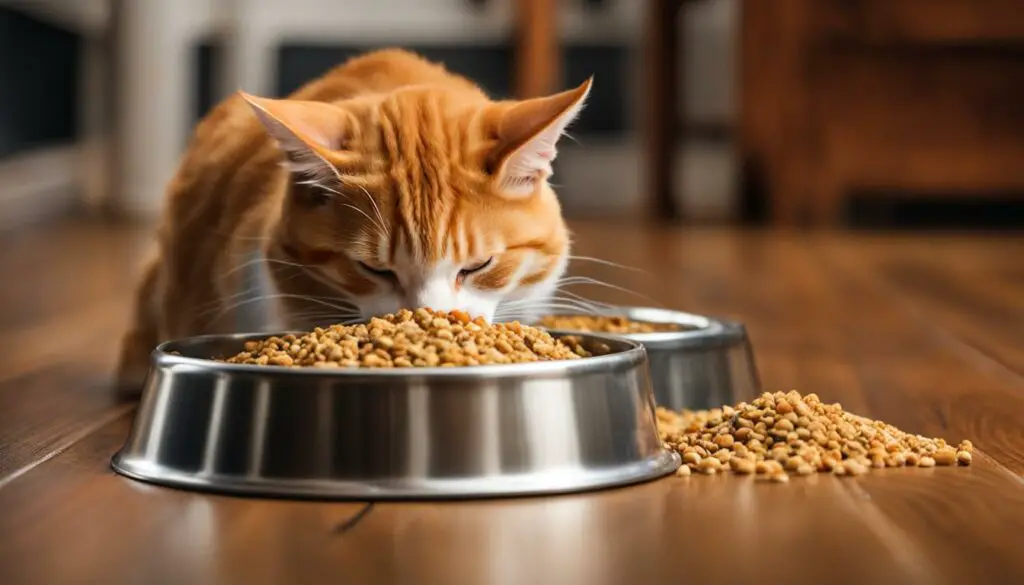Sneezing in cats while eating can be a cause for concern. While an occasional sneeze is normal, persistent sneezing during meals may indicate an underlying issue. It is important to understand the causes and find appropriate solutions to ensure the health of your cat.
Key Takeaways:
- Occasional sneezing in cats is normal and often a response to irritants in the nasal passages.
- Persistent sneezing during meals may indicate infections, allergies, dental disease, or foreign bodies.
- Viral, bacterial, or fungal infections are common causes of sneezing in cats.
- Inhaled irritants or allergens, such as cigarette smoke or dust, can irritate the nasal passages and cause sneezing.
- Other potential causes of sneezing include intranasal vaccines, tooth root infections, or in rare cases, cancer.
By understanding the causes and seeking appropriate solutions, you can help keep your cat healthy and minimize sneezing episodes. Regular veterinary care and a clean living environment are essential for preventing and addressing sneezing issues in cats.
Normal Sneezing in Cats
Occasional sneezing in a cat is a normal and natural bodily response to irritants in the nasal passages. Just like humans, cats can sneeze when they encounter dust, pollen, or other substances that cause irritation. Sneezing can also be triggered by excitement or sudden movements, similar to how we may sneeze when startled or excited. It’s important to remember that occasional sneezing in cats is usually nothing to worry about, unless it becomes persistent or is accompanied by other concerning symptoms.
In most cases, occasional sneezing in cats is harmless and no cause for alarm. However, if your cat sneezes frequently or exhibits other symptoms such as nasal discharge, coughing, or difficulty breathing, it’s best to consult with a veterinarian to rule out any underlying health issues. A thorough examination by a professional can help determine whether the sneezing is normal or a sign of a more serious condition.
It’s worth noting that cats have a highly sensitive sense of smell, so they may sneeze more frequently than humans due to their heightened olfactory capabilities. If your cat’s sneezing seems to be triggered by specific irritants or situations, such as exposure to strong odors or environmental changes, it’s helpful to take note of these potential triggers and try to minimize your cat’s exposure to them whenever possible.
| Causes of Sneezing in Cats | Treatment Options |
|---|---|
| Occasional sneezing due to irritants | No treatment necessary, monitor for persistent symptoms |
| Infections (viral, bacterial, fungal) | Antibiotics or antifungal medications as prescribed by a veterinarian |
| Allergies | Allergy immunotherapy, special diet, or medication |
| Dental disease | Dental treatment or procedures to address infection or inflammation |
| Foreign bodies | Veterinary intervention to locate and remove the foreign object |
Remember, occasional sneezing in cats is normal, but if you notice any persistent or concerning symptoms, it’s always best to consult with a veterinarian to ensure the health and well-being of your furry friend.
Infections as a Cause of Sneezing
Viral, bacterial, or fungal infections are common causes of sneezing in cats. Upper respiratory infections, such as those caused by the feline herpes virus or feline calicivirus, are prevalent and can lead to sneezing. These infections often affect young cats and can be prevented with vaccinations. Other infections, such as feline infectious peritonitis or feline leukemia, may also cause sneezing. It is important to note that while sneezing is a common symptom of infections, it can also be accompanied by other symptoms like nasal discharge, coughing, and fever.
Infections and Symptoms
When it comes to upper respiratory infections, feline herpes virus and feline calicivirus are the main culprits. These infections can cause sneezing, nasal discharge, coughing, decreased appetite, and fever. Treatment may involve cleaning discharge, providing proper nutrition and hydration, and using a humidifier to relieve symptoms. Vaccination is crucial in preventing these infections and keeping cats healthy. It is best to consult a veterinarian for proper diagnosis and treatment if you suspect your cat is suffering from an infection.
Fungal Infections
In addition to viral and bacterial infections, cats can also develop fungal infections. While rare, these infections can cause sneezing, weight loss, lack of appetite, and unhealing wounds. Cryptococcus is a common fungal infection that affects cats. Diagnosis usually involves blood tests, rhinoscopy, or biopsy. Antifungal medications are prescribed to treat these infections, and the duration of treatment can last several months until the infection is fully resolved.
| Cause | Symptoms | Treatment |
|---|---|---|
| Viral, bacterial, or fungal infections | Sneezing, nasal discharge, coughing, decreased appetite, fever | Vaccination, cleaning discharge, proper nutrition and hydration, use of humidifiers |
| Feline herpes virus and feline calicivirus | Sneezing, nasal discharge, coughing, decreased appetite, fever | Proper nutrition and hydration, cleaning discharge, use of humidifiers, vaccinations |
| Fungal infections (e.g., Cryptococcus) | Sneezing, weight loss, lack of appetite, unhealing wounds | Antifungal medications administered for several months |
Inhaled Irritants and Allergens
Cats can be sensitive to inhaled irritants or allergens, which can lead to sneezing episodes. Common potential irritants or allergens that can trigger sneezing in cats include cigarette smoke, perfumes, cleaning agents, dust, pollen, and mold. While cats are generally less prone to allergies compared to humans, they can still experience allergic reactions that manifest as sneezing. In some cases, cats may also exhibit signs of itchy skin if their sneezing is related to allergies. It is important to identify and minimize exposure to these irritants to help alleviate sneezing in cats.
Inhaled irritants or allergens can cause irritation and inflammation in a cat’s nasal passages, leading to sneezing as a protective reflex. Cats may also develop an allergic response to certain substances, triggering more frequent sneezing episodes. It is essential to create a clean and non-irritating environment for cats to help reduce their exposure to potential allergens and irritants.
Allergies in Cats
Allergies can manifest in various ways in cats, including sneezing. Common symptoms of allergies in cats may include sneezing, skin irritation, hair loss, and itchiness. Cats can be allergic to a range of substances, such as mold, dust, perfume, and cleaning supplies. Identifying and eliminating allergens from the cat’s environment can help alleviate sneezing and other allergy-related symptoms. In some cases, it may be necessary to consult with a veterinarian to determine the specific allergen causing the reaction and develop a suitable treatment plan.
| Allergens | Symptoms |
|---|---|
| Mold | Sneezing, skin irritation, itchiness |
| Dust | Sneezing, coughing, watery eyes |
| Perfume | Sneezing, skin irritation, difficulty breathing |
| Cleaning supplies | Sneezing, coughing, respiratory distress |
If a cat’s sneezing is suspected to be caused by allergies, a veterinarian may recommend allergy testing or trials to pinpoint the specific allergen. Treatment for allergies in cats may involve customized allergy immunotherapy, a special diet, or medications to manage symptoms. Regular monitoring and management of allergies can help minimize sneezing episodes and improve the overall well-being of the cat.

Other Potential Causes of Sneezing
Sneezing in cats can have various causes beyond infections and allergies. Some other potential factors that may contribute to sneezing in cats include intranasal vaccines, tooth root infections, and in rare cases, cancer. It is important to be aware of these possibilities and monitor your cat for any accompanying symptoms or changes in behavior.
One potential cause of sneezing in cats is the administration of intranasal vaccines. These vaccines are given to protect against certain respiratory diseases, but they can sometimes cause temporary sneezing as a side effect. If the sneezing persists for an extended period or if other symptoms arise, it is advisable to consult a veterinarian.
Tooth root infections can also lead to sneezing in cats. Infections in the teeth can spread to the surrounding nasal passages, causing irritation and inflammation. Cats with tooth root infections may exhibit symptoms such as bad breath, swollen gums, or difficulty eating. Treatment typically involves dental procedures to address the infection, which may include tooth extraction.
In rare cases, sneezing in cats may be a sign of cancer. Nasal tumors can obstruct the nasal passages and cause persistent sneezing. Other symptoms that may accompany nasal tumors include nasal discharge, facial swelling, or changes in appetite or weight. If you suspect that your cat may have cancer, it is crucial to seek veterinary attention as soon as possible for proper diagnosis and treatment.
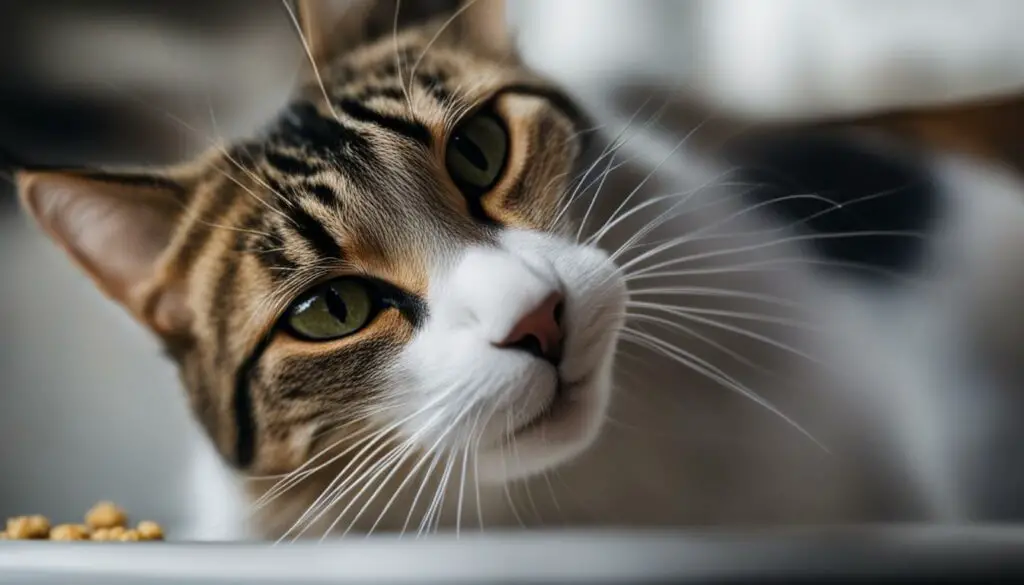
Potential Causes of Sneezing in Cats:
- Intranasal vaccines
- Tooth root infections
- Cancer
| Cause | Symptoms | Treatment |
|---|---|---|
| Intranasal vaccines | Temporary sneezing | Monitor and consult veterinarian if persistent |
| Tooth root infections | Bad breath, swollen gums, difficulty eating | Dental procedures, potentially tooth extraction |
| Cancer | Nasal obstruction, persistent sneezing, nasal discharge, facial swelling | Veterinary attention for diagnosis and treatment |
Sneezing and Upper Respiratory Infections
Sneezing is often a symptom of upper respiratory infections in cats, such as feline calicivirus and feline herpesvirus. These infections can cause various symptoms that affect the nose, throat, and respiratory system. Common signs of upper respiratory infections include:
- Nasal discharge
- Watery or inflamed eyes
- Coughing
- Sneezing
- Fever
- Decreased appetite
If you notice any of these symptoms in your cat, it is important to consult a veterinarian for a proper diagnosis. Upper respiratory infections are highly contagious among cats, and prompt treatment can help prevent the spread of the infection to other feline companions.
Treatment for upper respiratory infections often involves keeping the cat comfortable and providing supportive care. This may include:
- Cleaning the nasal discharge to prevent blockage
- Ensuring proper nutrition and hydration
- Using a humidifier to relieve congestion
Vaccination is an essential preventive measure against feline calicivirus and feline herpesvirus. Regular vaccinations can significantly reduce the risk of upper respiratory infections in cats, keeping them healthy and sneeze-free.
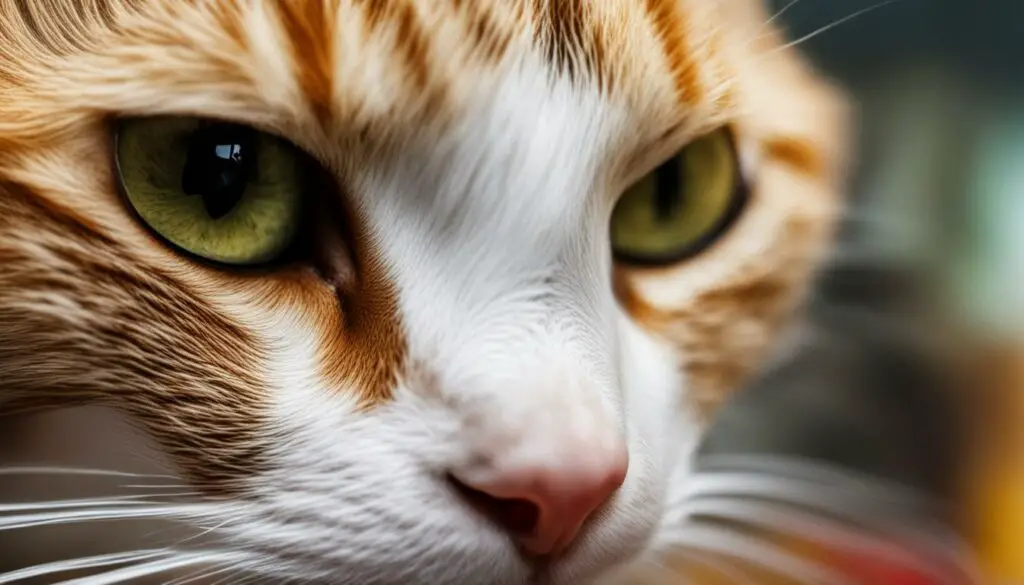
Symptoms of Upper Respiratory Infections
| Symptoms | Description |
|---|---|
| Nasal discharge | Discharge or mucus coming from the nose. |
| Watery or inflamed eyes | Excessive tearing or redness in the eyes. |
| Coughing | Repetitive hacking or coughing sounds. |
| Sneezing | Forceful expulsion of air through the nose and mouth. |
| Fever | Elevated body temperature, often accompanied by lethargy. |
| Decreased appetite | Lack of interest in food or reduced intake. |
“Upper respiratory infections are common in cats and can lead to discomfort and respiratory distress. Seeking veterinary care and following treatment recommendations are crucial for the well-being of affected cats.”
Nasal and Sinus Issues
When it comes to sneezing in cats, nasal and sinus issues can be a common culprit. Conditions such as rhinitis and sinusitis can lead to inflammation in the nose and sinuses, resulting in sneezing, nasal discharge, heavy breathing, and tearing of the eyes. These symptoms can be uncomfortable for your feline friend, and it’s important to address them promptly.
Symptoms of Nasal and Sinus Issues:
- Sneezing
- Nasal discharge
- Heavy breathing
- Tearing of the eyes
If you suspect that your cat is experiencing nasal and sinus issues, it’s crucial to consult with a veterinarian for a proper diagnosis. A physical examination, including the use of rhinoscopy and possibly a biopsy, may be necessary to determine the underlying cause of the symptoms.
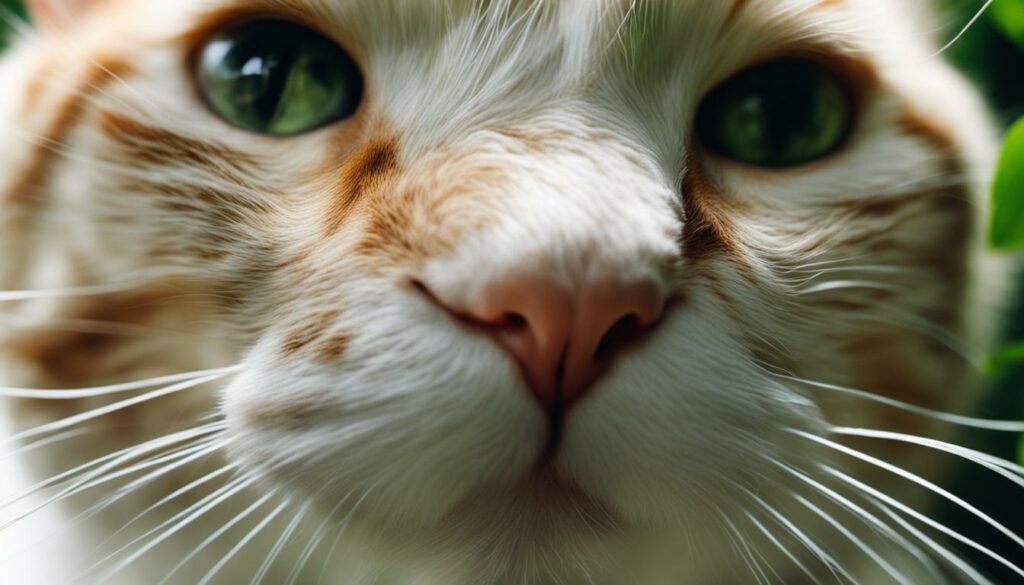
| Nasal and Sinus Issues | Symptoms | Treatment |
|---|---|---|
| Rhinitis | Sneezing, nasal discharge, heavy breathing, tearing of the eyes | Treatment options depend on the severity of the condition |
| Sinusitis | Sneezing, nasal discharge, heavy breathing, tearing of the eyes | Treatment options depend on the severity of the condition |
Treatment options for nasal and sinus issues will vary depending on the severity of the condition. Your veterinarian may recommend medications such as antibiotics or antifungal medications to address any underlying infections. In some cases, symptomatic relief can be provided through nasal lavage or the use of a humidifier to help reduce congestion. Your veterinarian will create a customized treatment plan based on your cat’s specific needs.
Allergies in Cats
Cats can develop allergies to various airborne irritants, such as dust, mold, pollen, and certain cleaning supplies. These allergies can cause sneezing, skin irritation, hair loss, and itchiness. It is important to identify and address these allergies to ensure the health and well-being of your cat.
Common symptoms of allergies in cats include:
- Sneezing
- Itchy and irritated skin
- Excessive grooming
- Red and watery eyes
To treat allergies in cats, a customized allergy immunotherapy plan may be recommended by your veterinarian. This can involve regular allergy shots or the use of oral medication. In some cases, dietary changes may be necessary to avoid allergens.
It is also important to create an allergen-free environment for your cat. This can be achieved by removing potential irritants, such as strong-smelling cleaning agents or perfumes, from your home. Regular cleaning and vacuuming can help reduce dust and allergens in the environment. Additionally, providing a high-quality diet and maintaining good overall health can help strengthen your cat’s immune system and minimize allergic reactions.
Allergy Symptoms in Cats:
“My cat started sneezing uncontrollably and scratching excessively. I noticed redness and irritation on her skin. After consulting with my veterinarian, I learned that she has developed allergies. We have now started a customized allergy immunotherapy treatment plan and have removed potential allergens from our home. Her symptoms have significantly improved, and she is much more comfortable.”
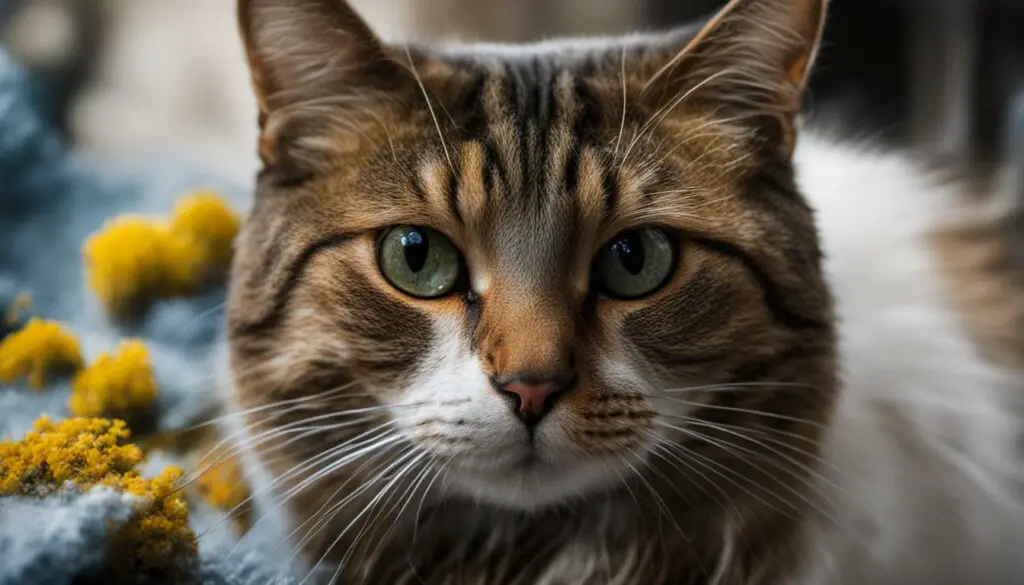
Bacterial Infections and Sneezing
Bacterial infections can be a common cause of sneezing in cats. These infections can result in symptoms such as yellow or green discharge from the eyes and nose, along with sneezing. Common bacterial infections in cats include bordetella, mycoplasma, and chlamydia. These infections usually occur after a respiratory virus weakens the cat’s immune system, making them more susceptible to bacterial invasion.
To properly diagnose a bacterial infection, a veterinarian will perform a physical examination and may collect samples for laboratory testing. Treatment typically involves the use of appropriate antibiotics prescribed by a veterinarian. It is crucial to follow the prescribed course of antibiotics and complete the full treatment regimen to effectively eliminate the infection.
Symptoms of Bacterial Infections in Cats:
- Sneezing
- Yellow or green discharge from the eyes and nose
- Coughing
- Decreased appetite
- Lethargy
- Fever
Treatment for Bacterial Infections in Cats:
The treatment for bacterial infections in cats typically involves the administration of antibiotics. The type of antibiotics prescribed will depend on the specific bacterial strain causing the infection. It is essential to follow the veterinarian’s instructions regarding dosage and duration of treatment. In some cases, supportive care such as providing fluids or maintaining proper nutrition may also be necessary to help the cat recover.
Prevention:
Preventing bacterial infections in cats can be challenging as they are often secondary to viral infections. However, maintaining good overall health and providing regular veterinary care can help reduce the risk. Vaccinations can play a crucial role in preventing certain respiratory infections, which, in turn, can reduce the likelihood of bacterial infections developing. Ensuring a clean environment and minimizing stress can also contribute to a cat’s overall immune health.
Dental Disease and Sneezing
Dental disease in cats can lead to sneezing due to infection or inflammation in the teeth, which can affect the nasal passages. It is important for cat owners to be aware of the symptoms of dental disease and seek appropriate treatment to alleviate sneezing and prevent further complications.
The symptoms of dental disease in cats may include swollen or tender gums, bleeding in the mouth, pain, and difficulty eating. These dental issues can cause irritation in the nasal passages, leading to sneezing. If left untreated, dental disease can progress and result in more severe health issues for the cat.
Treatment for dental disease in cats may involve addressing the dental infection or inflammation through professional dental cleaning, tooth extraction, or other necessary dental procedures. Regular dental care and maintenance are essential in preventing and treating dental disease, which can help reduce sneezing episodes and promote overall oral health.
It is advised to consult a veterinarian for a proper diagnosis and treatment plan tailored to the specific needs of the cat. Dental care should be a part of regular veterinary check-ups to ensure early detection and intervention for any dental issues that may be causing sneezing or other health concerns.
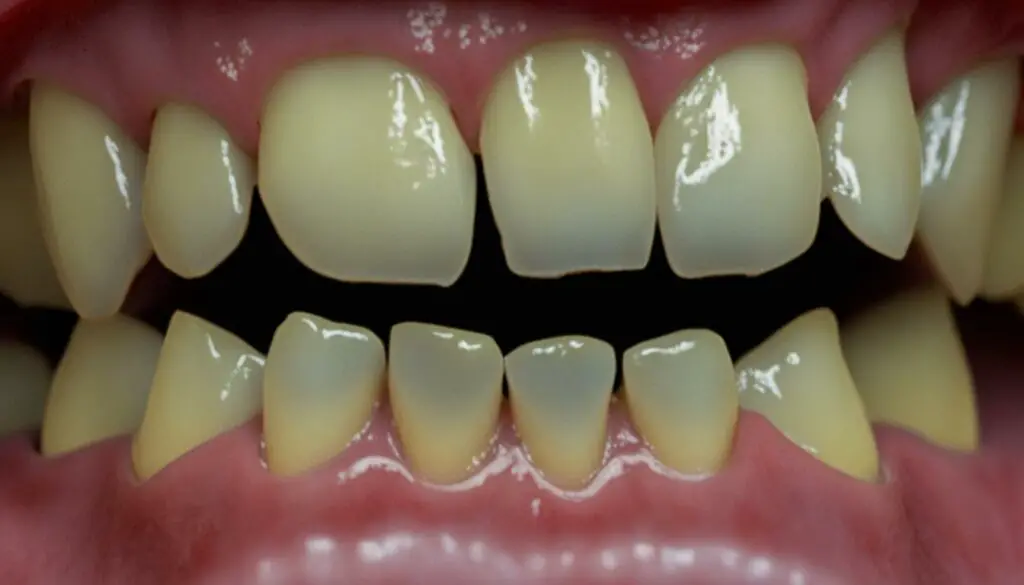
Summary:
- Dental disease in cats can lead to sneezing due to infection or inflammation in the teeth.
- Symptoms of dental disease in cats include swollen or tender gums, bleeding in the mouth, pain, and difficulty eating.
- Treatment for dental disease may involve professional dental cleaning, tooth extraction, or other necessary dental procedures.
- Regular dental care and maintenance are essential in preventing and treating dental disease.
- Consulting a veterinarian for a proper diagnosis and treatment plan is recommended.
Fungal Infections and Sneezing
Fungal infections in cats, although rare, can cause sneezing and other symptoms that may affect their overall health. It is important to be aware of the symptoms and seek appropriate treatment to ensure your cat’s well-being.
Symptoms of fungal infections in cats may include weight loss, lack of appetite, unhealing wounds, and of course, sneezing. These infections, particularly cryptococcus, can have serious consequences if left untreated.
Diagnosis usually involves blood tests and may require procedures such as rhinoscopy or biopsy. Treatment typically consists of antifungal medications administered over several months until the infection is resolved.
Seeking prompt veterinary care and following the prescribed treatment plan is crucial in managing fungal infections in cats and minimizing the impact on their health.
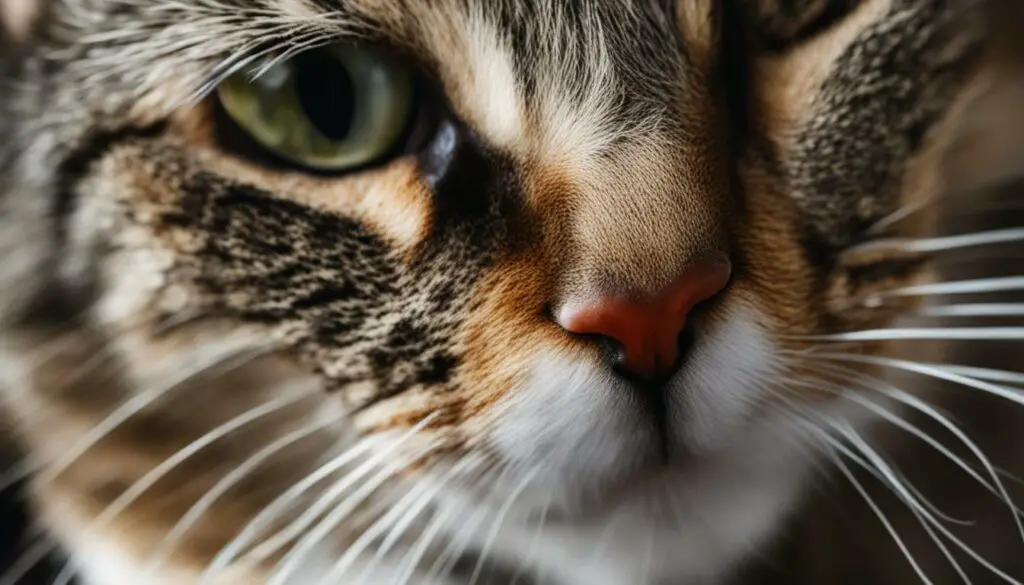
Foreign Bodies and Sneezing
Sneezing in cats can sometimes be caused by foreign objects that become lodged in their nose or throat. These objects can include grass awns or blades of grass, which can irritate the respiratory system and trigger sneezing. In more severe cases, foreign objects may cause breathing obstructions and pose a serious threat to the cat’s life.
Common symptoms of foreign bodies in a cat’s nose or throat include persistent sneezing, coughing, and difficulty breathing. If you notice these signs, it is important to seek immediate veterinary attention to locate and remove the foreign object. Diagnostic procedures such as physical examination and possibly anesthesia may be necessary to safely remove the object, which could involve surgery or other procedures.
Preventing foreign bodies in cats can be achieved by keeping their environment free of objects that can easily be swallowed or become lodged in their nose or throat. Additionally, regular veterinary check-ups can help identify any potential issues and ensure the overall health and well-being of your cat.
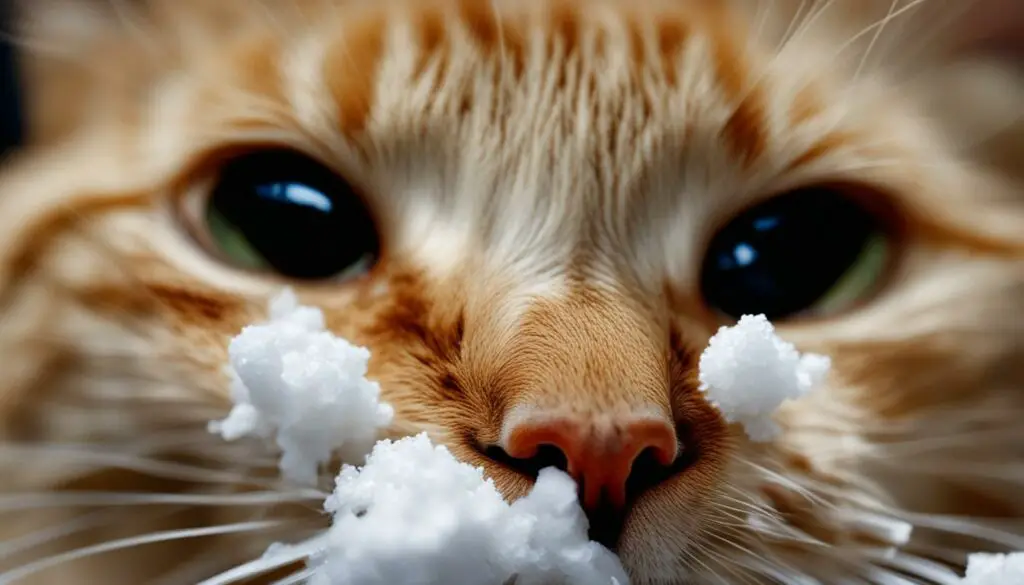
Table: Symptoms and Treatment for Foreign Bodies
| Symptoms | Treatment |
|---|---|
| Persistent sneezing | Immediate veterinary attention to locate and remove the foreign object |
| Coughing | Diagnostic procedures such as physical examination and anesthesia may be necessary for safe removal |
| Difficulty breathing | Surgery or other procedures may be required to remove the object |
Treatment Options for Sneezing in Cats
When it comes to treating sneezing in cats, the approach depends on the underlying cause. In some cases, antibiotics may be prescribed to address bacterial infections, while antifungal medications are used for fungal infections. However, it’s important to note that not all cases of sneezing require medication. In mild cases, at-home remedies and environmental changes can provide relief for your feline friend.
Nasal lavage can be a helpful treatment option for cats with nasal congestion. This involves flushing out the nasal passages with a saline solution, which can help remove excess mucus and irritants. It’s important to use a saline solution specifically formulated for cats, as human saline solutions may contain additives that are harmful to them.
Humidifiers can also be beneficial in reducing sneezing episodes in cats. Adding moisture to the air can help soothe irritated nasal passages and provide relief. It’s best to use a cool mist humidifier and ensure that it is regularly cleaned to prevent the growth of bacteria or mold. Additionally, using air purifiers can help eliminate airborne irritants that may trigger sneezing in cats.
In more severe cases, additional treatment options may be necessary. This can include the use of steroids or antihistamines to reduce inflammation and alleviate symptoms. In some instances, surgery may be required to remove foreign bodies or address underlying issues like dental disease. It’s important to consult with a veterinarian to determine the most appropriate treatment plan for your cat.
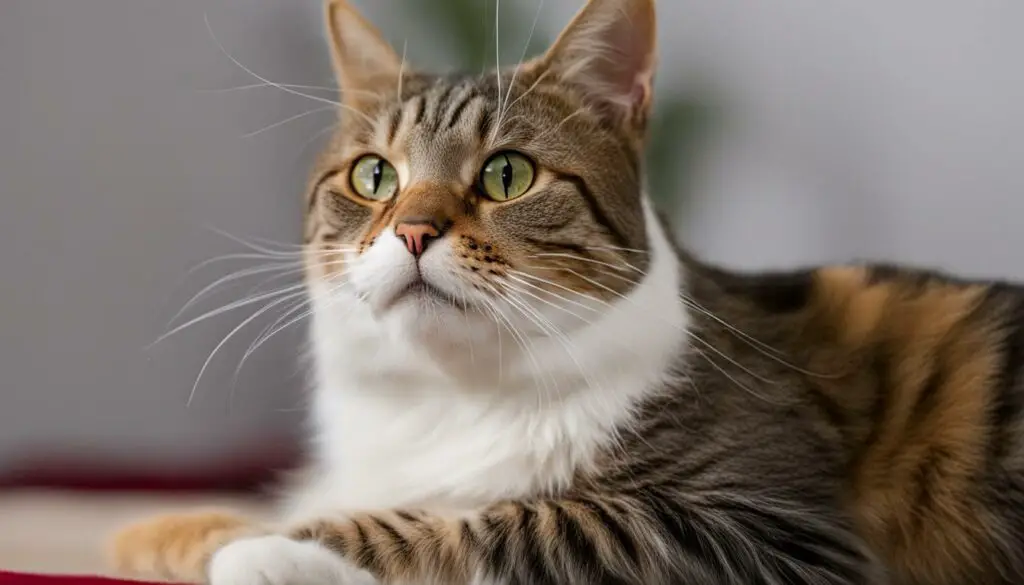
Possible Treatment Options for Sneezing in Cats
| Treatment | Description |
|---|---|
| Antibiotics | Prescribed for bacterial infections that cause sneezing. |
| Nasal Lavage | Flushing the nasal passages with a saline solution to remove mucus and irritants. |
| Humidifiers | Adding moisture to the air to soothe nasal passages. |
| Air Purifiers | Eliminating airborne irritants that may trigger sneezing. |
| Steroids | Reducing inflammation and alleviating symptoms. |
| Antihistamines | Helping to alleviate sneezing caused by allergies. |
| Surgery | Removing foreign bodies or addressing underlying issues like dental disease. |
It’s important to monitor your cat’s response to treatment and consult with a veterinarian if sneezing persists or worsens. They can provide further guidance and recommend any necessary adjustments to the treatment plan. With proper care and attention, you can help your cat find relief from sneezing and maintain their overall health and well-being.
At-Home Remedies for Sneezing in Cats
When it comes to alleviating sneezing in cats, there are a few at-home remedies that you can try. These remedies can help provide relief for your furry friend and create a more comfortable environment. One important step is removing strong odors, as they can irritate your cat’s respiratory system and trigger sneezing. Avoid using air fresheners or perfumes that may contain harsh chemicals. Opt for natural, unscented cleaning products to minimize the risk of respiratory irritation.
Additionally, it’s crucial to avoid using toxic disinfectants that can worsen your cat’s sneezing. Opt for pet-safe cleaning products or make your own using gentle ingredients like vinegar and water. Keeping your cat’s living space clean and free from irritants can help reduce sneezing episodes.
Adding moisture to the air can also help soothe your cat’s nasal passages and minimize sneezing. You can use a vaporizer or humidifier to increase humidity levels in your home, especially during dry seasons. Be sure to clean and maintain these devices regularly to prevent the growth of mold or bacteria.
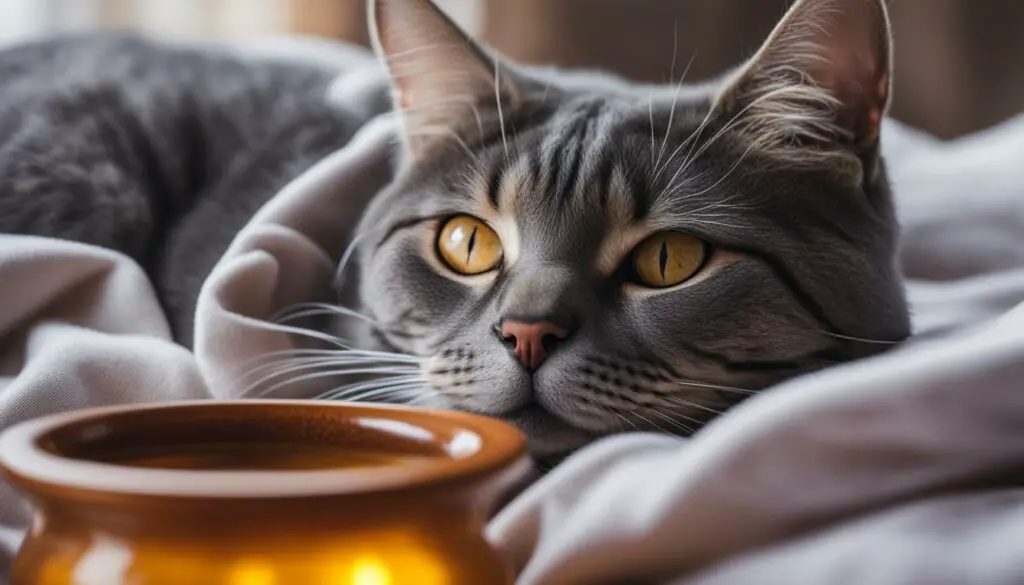
Quote:
By taking simple steps to remove strong odors and avoiding toxic disinfectants, you can create a healthier environment for your cat, reducing sneezing episodes and promoting overall well-being.
Lastly, enticing your cat’s appetite with potent-smelling food can help stimulate their senses and reduce sneezing. Offer high-quality, aromatic cat food options that your pet enjoys. If your cat has decreased appetite due to sneezing or other symptoms, consult with a veterinarian for appropriate dietary recommendations.
Prevention and Monitoring
Preventing sneezing in cats is essential for maintaining their overall health and well-being. By following a few simple steps and monitoring your furry friend closely, you can minimize the occurrence of sneezing and ensure their long-term comfort.
Regular veterinary care is crucial in preventing sneezing in cats. Schedule routine check-ups with your veterinarian to monitor your cat’s health and detect any underlying issues early on. During these visits, your vet can administer necessary vaccinations to prevent upper respiratory infections, which are a common cause of sneezing in cats.
Creating a clean and non-irritating environment is another key preventive measure. Keep their living spaces neat and tidy, regularly cleaning their litter boxes and bedding, and eliminating any potential irritants or allergens such as cigarette smoke, strong perfumes, or toxic cleaning agents. You can also consider using air purifiers to help eliminate airborne irritants that may trigger sneezing in your cat.
Monitoring your cat’s symptoms and behavior is crucial in detecting any changes or persistent sneezing. Be observant of other accompanying symptoms such as nasal discharge, decreased appetite, or difficulty breathing. If you notice any concerning signs, consult your veterinarian immediately for a proper diagnosis and treatment plan.
| Prevention and Monitoring Tips |
|---|
| Regular veterinary check-ups |
| Vaccinations to prevent respiratory infections |
| Maintaining a clean and non-irritating environment |
| Using air purifiers to eliminate irritants |
| Monitoring for changes in symptoms and behavior |
By taking these preventive measures and closely monitoring your cat’s health, you can help minimize episodes of sneezing and ensure a happy and healthy feline companion.

Conclusion
After exploring the various causes and solutions for cat sneezing while eating, it is clear that this behavior can range from normal to indicative of underlying issues. Occasional sneezing is usually harmless and a natural response to irritants or excitement. However, persistent sneezing, accompanied by other symptoms, may signal infections, allergies, dental problems, or the presence of foreign bodies.
To address cat sneezing, it is important to consult a veterinarian for proper diagnosis and treatment. Depending on the cause, treatment options may include antibiotics, antifungal medications, or at-home remedies. Regular monitoring of your cat’s symptoms and behavior, along with routine veterinary check-ups, play a crucial role in maintaining their overall health.
Prevention is key to minimizing sneezing episodes in cats. This includes providing a clean and non-irritating environment, vaccinating against common respiratory infections, and ensuring proper dental care. By taking these measures, you can help keep your cat healthy and reduce the occurrence of sneezing while eating.
In conclusion, cat sneezing while eating can be a normal occurrence or a sign of an underlying issue. Understanding the causes, seeking veterinary care when necessary, and implementing preventive measures are essential in providing the best care for your feline friend.
FAQ
Is it normal for cats to sneeze while eating?
An occasional sneeze in a cat is normal and often a response to irritants in the nasal passages. Sneezing can be triggered by excitement or movement. It is not a cause for alarm unless it becomes persistent or is accompanied by other symptoms.
What are the common causes of sneezing in cats?
Sneezing in cats can be caused by infections (viral, bacterial, or fungal), inhaled irritants or allergens, intranasal vaccines, blockage in the nasal passages, tooth root infections, or in rare cases, cancer. Foreign objects lodged in the nasal passage or throat can also cause sneezing.
When should I be concerned about my cat’s sneezing?
It is important to monitor your cat and consult a veterinarian if sneezing becomes persistent or severe. Other symptoms to watch for include eye discharge, decreased appetite, or trouble breathing.
How can upper respiratory infections cause sneezing in cats?
Upper respiratory infections in cats, such as feline calicivirus and feline herpesvirus, can cause sneezing along with symptoms like nasal and eye discharge, coughing, decreased appetite, and fever. Treatment may involve cleaning discharge, nutrition and hydration support, and using a humidifier to relieve symptoms. Vaccination can help prevent these infections.
What are the symptoms of nasal and sinus issues in cats?
Nasal and sinus issues can lead to sneezing in cats, along with symptoms like nasal discharge, heavy breathing, and tearing of the eyes.
Can cats have allergies that cause sneezing?
Cats can develop allergies to airborne irritants such as mold, dust, perfume, and cleaning supplies. Symptoms may include sneezing, skin irritation, hair loss, and itchiness. Treating allergies may involve customized allergy immunotherapy, a special diet, or medication. Identifying and eliminating allergens from the cat’s environment can also help alleviate symptoms.
Are bacterial infections a common cause of sneezing in cats?
Yes, bacterial infections can cause sneezing in cats, often accompanied by yellow or green discharge from the eyes and nose. Common bacterial infections include bordetella, mycoplasma, and chlamydia. Treatment typically involves antibiotics prescribed by a veterinarian.
How does dental disease contribute to sneezing in cats?
Dental disease can lead to sneezing in cats due to infection or inflammation in the teeth and the proximity to the nasal passage. Symptoms may include swollen or tender gums, bleeding in the mouth, pain, and difficulty eating. Treatment involves addressing the dental infection or inflammation, which may require tooth removal or other dental procedures.
Can cats develop fungal infections that cause sneezing?
Though rare, cats can develop fungal infections, particularly cryptococcus. Fungal infections can cause sneezing and other symptoms such as weight loss, lack of appetite, and unhealing wounds. Treatment includes antifungal medications administered over several months until the infection resolves.
What should I do if my cat has a foreign object in its nose or throat?
Foreign objects, such as grass awns or blades of grass, can become lodged in a cat’s nasal passage or throat and cause sneezing and coughing. Immediate veterinary attention is necessary to locate and remove the foreign object, which may require anesthesia and possibly surgery or other procedures.
What are the treatment options for sneezing in cats?
The treatment for sneezing in cats depends on the underlying cause. Antibiotics are often prescribed for bacterial infections, while antifungal medications are used for fungal infections. Nasal lavage and humidifiers can provide temporary relief and remove nasal debris. Air purifiers can help eliminate airborne irritants. Other treatment options may include steroids, antihistamines, and surgery in more severe cases.
Are there any at-home remedies for sneezing in cats?
In mild cases of sneezing, certain at-home remedies may provide relief for cats. This can include removing strong odors, such as air fresheners or perfumes, that may irritate their respiratory system. Avoiding toxic disinfectants and maintaining a clean environment can also help alleviate symptoms. Using a vaporizer to add moisture to the air and offering potent-smelling food can stimulate appetite and reduce sneezing.
How can I prevent sneezing in cats?
Preventing sneezing in cats involves maintaining a clean and non-irritating environment, regular vaccinations to prevent upper respiratory infections, and proper dental care. Monitoring your cat’s symptoms and behavior is important to detect any changes or persistent sneezing. Regular veterinary check-ups can help identify and address any underlying issues to keep your cat healthy.
What should I do if my cat’s sneezing persists?
If your cat’s sneezing persists or worsens, it is recommended to consult a veterinarian for a proper diagnosis and treatment plan.

